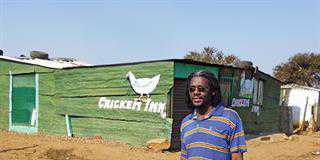
Government support for smallholder farmers on the ground is falling far short, judging by the experience of small-
scale farmers in Gauteng and Limpopo. This is despite government’s avowed intentions to grow the smallholder farming sector. These shortcomings were highlighted in a recent media trip organised by the Southern Africa Food Lab, a private sector initiative that seeks to find innovative solutions to food security. Stakeholders include NGOs, the department of agriculture, retailers, producers and donors.
Too small to work
Smallholder farmer Justice Mabena grows tomatoes, green peppers and extra-hot chillies on a 16ha plot an hour’s drive north of Johannesburg. Raised by his grandmother, Mabena was forced to leave high school early due to the tuition costs, and became a food vendor at a railway station. A hard worker and with a keen business mind, he ended up becoming the owner of a successful butchery. He ran this for six years before selling it two years ago to buy the 16ha plot.
Mabena admits he has made many mistakes here during this time, as he arrived with little farming knowledge. “I’ve had to learn to do things at the right time. You can spend a lot of money on seed, fertilisers and sprays, but if you don’t use them when you’re supposed to, you’re just wasting your money,” he says.
Timing also applies to the marketing of produce and Mabena has had to learn to plant according to market demand. Unlike many small-scale farmers, he has had little difficulty finding a market for his produce. “There’s a big market for tomatoes here. I sell most of them directly from my farm,” he says. He also supplies supermarket group Spar and the Joburg Fresh Produce Market.
A need to expand
These successes have been outweighed by problems, however. According to Mabena, he does not have access to enough water and as a result can only farm about one hectare of the 16ha farm. The farm has poor quality soil and he is forced to spend a great deal on fertiliser to ensure a decent yield. And labour is very expensive.
He has invested virtually all the capital from the sale of the butchery in developing the farm. Most of the money was spent on drilling a borehole, enriching the soil with fertiliser and manure, buying production inputs, fencing off a part of the property and building a house.
The stumbling block now is that his revenue from 1ha is simply insufficient to fund expansion. According to Mabena, if he could plant 5ha of tomatoes he and his family would be able to sustain themselves properly. But to do so would require another borehole, a tractor, a plough and preferably a cold store. Although he has had contact with government- appointed extension officers, the full extent of the support he has received to date has been limited to training courses.
What he really needs from government, he says, is financial assistance for a borehole and a tractor, as well as some assistance to pay his workers for three months until he can harvest. If he can get this, he is sure that he will be able to farm independently thereafter. “Agriculture is a business that can take one far. If I could just get to 5ha with some support, the rest I can do on my own,” he says.
Masoma irrigation scheme
The 79ha Masoma irrigation scheme, supplied with water from the Tours dam, dates back to the 1960s, when each farmer was allocated one morgen of land on which to farm. Different farmers now occupy the land, but little, it seems, has changed here in 50 years. The small plots are still tended manually and irrigated haphazardly with limited access to the water supply through only one set of irrigation equipment shared by the 53 farmers who each farm on roughly 1,2ha.

Farmers at the Masoma irrigation scheme say their main problem is lack of government support. From left are: Annetjie Njagale, Wilmiena Manqena, Anna Phasha, Irene Matjokotja and Liesbet Mameje.
Accessing markets and transporting their produce to the markets are amongst their greatest challenges. The farmers produce vegetables, groundnuts, oranges and sugarcane, both for their own domestic consumption and to sell commercially. The farmers say that the only crop that earns them any profit is the sugarcane, which they sell to members of the Zion Christian Church for use at their vast annual Easter gathering at Zion City Moria not far away.
Because of their limited access to irrigation, the farmers depend on rain. And, as one farmer commented, “this year it is bad”, due to the drought. Joseph Shikwambana, an extension officer with the Limpopo agriculture department appointed to provide support to these farmers, describes their main challenges as “poverty and old age”.
In contrast, according to the farmers, their greatest challenge is inadequate support from government. The farmers say that while they do receive input support such as fertiliser and seeds from time to time, these often arrive too late or in inadequate quantities. Sometimes, they receive the wrong products, or if they receive the right products, they are given no training on how to use them correctly.
A farmer recalls how officials from the agriculture department showed up one day, randomly selected three farmers, and planted some orange trees for them, with a promise to return regularly to provide training in growing citrus. That was the last they saw of them. The farmers now have a crop they don’t have the knowledge or resources to grow, and are unable to sell anyway as they have no ready market for it.
Extension officers under pressure
Shikwambana concedes there is “much room for improvement” in the nature and level of support given to these farmers.But extension officers face their own challenges. According to Kenneth Carden, the team leader for supporting smallholder agriculture at the Southern Africa Food Lab, government employs only about 20% of the number of extension officers required by South African farmers.

Joseph Shikwambana, government extension officer, admits there is ‘much room for improvement’
in farmer support.
Shikwambana adds that extension officers often do not have access to the resources they need to do their jobs properly. They struggle with what he calls government’s “top-down approach” which often sees provincial or national departments micromanage decisions on smallholder farmer support without consulting either the farmers or the extension officers to determine farmers’ real needs and challenges.
Fortunately, non-government institutions have stepped in to fill some of the gaps. Lima Rural Development Foundation, for example, has started providing support to the farmers of the Masoma irrigation scheme. According to the foundation’s Seokoma Silas, the services they supply include training, help with market access, and in some instances, assisting farmers to obtain small production loans.
Fighting hunger
Norah Mlondobozi is a small-scale farmer who grows vegetables near Giyani in Limpopo’s Mopani district. She says that so far this year, she has not had a single visit from a government-appointed extension officer, but she has received extension support from TechnoServe, an international non-profit body that provides extension and advisory services to farmers across a number of provinces.
TechnoServe supports and trains farmers to plant according to market demand. Moloko Semenya, an extension officer with the organisation in Limpopo, explains that its mission is to support small-scale farmers to become commercially successful. She and her fellow extension officers work only with farmers who have at least some experience in selling their crops and who have access to at least 5ha of land. She adds that the two main challenges faced by all small-scale farmers are access to markets and finance.
Mlondobozi used to be a high school mathematics teacher but gave up teaching for farming as she could no longer bear trying to teach hungry children. Her other motivation was to help create jobs for people in her community. “I thought if I could farm and employ at least five women, at least five families would have food to eat,” she says.
Mlondobozi’s farming business has grown so much that she now employs eight people full-time; at peak harvest times, she employs up to 20 people.She has access to 50ha of communal land and grows tomatoes, butternuts, green beans, green peppers and okra in rotation on 28ha, selling mainly to fresh produce markets in Pretoria and Johannesburg. She also supplies supermarkets directly, but due to lack of support, cannot consistently produce enough to adhere to their requirements.
“The level of technical support we receive from the agriculture department is very poor,” she says.Mlondobozi helped establish the Mopani Farmers’ Union to represent smallholder farmers in the area. They hope that by standing together they can better lobby government for technical and financial support to develop farming in their community.
Quantity over quality
The policy environment for smallholder farmer development focuses more on growing the number of smallholders than on improving the plight of existing ones.Smallholder farmer development needs to play a key role in growing the farming sector and creating jobs in South Africa, according to both the National Development Plan (NDP) and government’s latest development plan for agriculture, the Agricultural Policy Action Plan.
The latter, a joint programme of the Department of Agriculture, Forestry and Fisheries and the Department of Rural Development and Land Reform, was launched in April 2015 with the aim of doubling the number of commercial smallholder farmers in South Africa by 2018/2019.
The NDP, for its part, proposes that an additional 320 000 small-scale farmers be established by 2030. The experience of these small-scale farmers in Gauteng and Limpopo, however, suggest that these figures are optimistic, to say the least.
For more information, email Kenneth Carden at [email protected].













